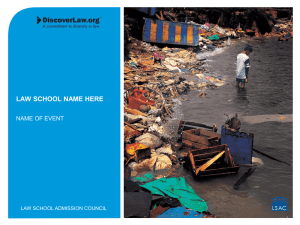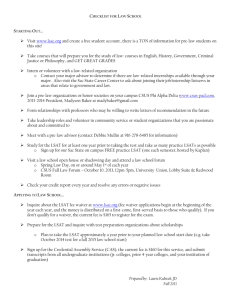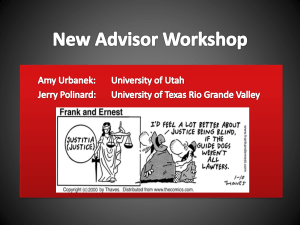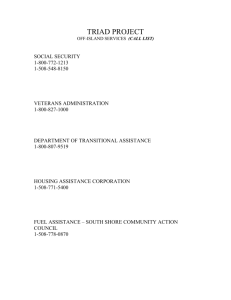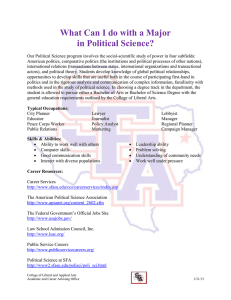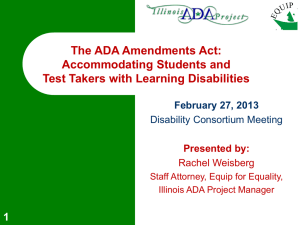L By Jessica L. Saldivar, J.D., LL.M. Candidate (Health Law)
advertisement
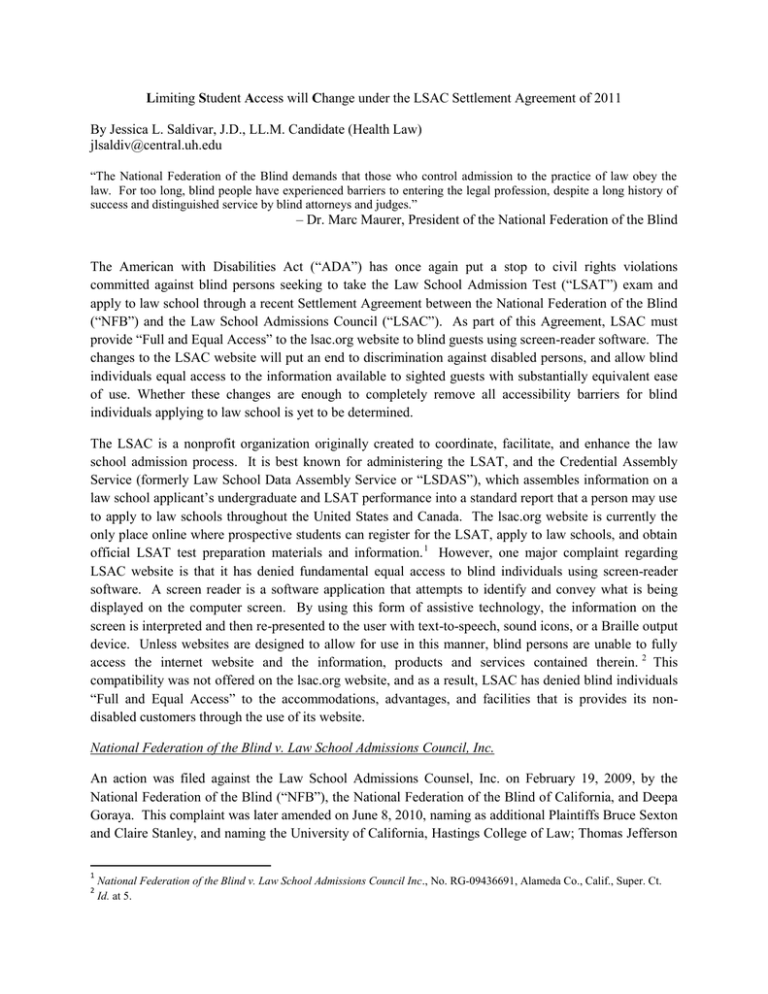
Limiting Student Access will Change under the LSAC Settlement Agreement of 2011 By Jessica L. Saldivar, J.D., LL.M. Candidate (Health Law) jlsaldiv@central.uh.edu “The National Federation of the Blind demands that those who control admission to the practice of law obey the law. For too long, blind people have experienced barriers to entering the legal profession, despite a long history of success and distinguished service by blind attorneys and judges.” – Dr. Marc Maurer, President of the National Federation of the Blind The American with Disabilities Act (“ADA”) has once again put a stop to civil rights violations committed against blind persons seeking to take the Law School Admission Test (“LSAT”) exam and apply to law school through a recent Settlement Agreement between the National Federation of the Blind (“NFB”) and the Law School Admissions Council (“LSAC”). As part of this Agreement, LSAC must provide “Full and Equal Access” to the lsac.org website to blind guests using screen-reader software. The changes to the LSAC website will put an end to discrimination against disabled persons, and allow blind individuals equal access to the information available to sighted guests with substantially equivalent ease of use. Whether these changes are enough to completely remove all accessibility barriers for blind individuals applying to law school is yet to be determined. The LSAC is a nonprofit organization originally created to coordinate, facilitate, and enhance the law school admission process. It is best known for administering the LSAT, and the Credential Assembly Service (formerly Law School Data Assembly Service or “LSDAS”), which assembles information on a law school applicant’s undergraduate and LSAT performance into a standard report that a person may use to apply to law schools throughout the United States and Canada. The lsac.org website is currently the only place online where prospective students can register for the LSAT, apply to law schools, and obtain official LSAT test preparation materials and information. 1 However, one major complaint regarding LSAC website is that it has denied fundamental equal access to blind individuals using screen-reader software. A screen reader is a software application that attempts to identify and convey what is being displayed on the computer screen. By using this form of assistive technology, the information on the screen is interpreted and then re-presented to the user with text-to-speech, sound icons, or a Braille output device. Unless websites are designed to allow for use in this manner, blind persons are unable to fully access the internet website and the information, products and services contained therein. 2 This compatibility was not offered on the lsac.org website, and as a result, LSAC has denied blind individuals “Full and Equal Access” to the accommodations, advantages, and facilities that is provides its nondisabled customers through the use of its website. National Federation of the Blind v. Law School Admissions Council, Inc. An action was filed against the Law School Admissions Counsel, Inc. on February 19, 2009, by the National Federation of the Blind (“NFB”), the National Federation of the Blind of California, and Deepa Goraya. This complaint was later amended on June 8, 2010, naming as additional Plaintiffs Bruce Sexton and Claire Stanley, and naming the University of California, Hastings College of Law; Thomas Jefferson 1 2 National Federation of the Blind v. Law School Admissions Council Inc., No. RG-09436691, Alameda Co., Calif., Super. Ct. Id. at 5. School of Law; Whittier Law School; and University of Chapman School of Law as additional Defendants. 3 In this case, the plaintiffs alleged that LSAC violated the California state laws of the Disabled Persons Act, California Civil Code §§ 54 et seq., the Unruh Civil Rights Act, California Civil Code §§ 51 et seq., and Titles II and III of the Americans with Disabilities Act, by maintaining its website, www.lsac.org, in a manner that is inaccessible to blind individuals using screen reader technology. Furthermore, these unlawful accessibility barriers discriminated against blind persons applying to law school and violated their civil right of equal access. The Plaintiffs claimed that the LSAC website contained multiple access barriers that made it difficult and nearly impossible for blind law school applicants and LSAT test takers to use the website and to obtain practice materials without sighted assistance.4 There were three specific accessibility barriers presented in the suit. The first allegation stated that the barriers included but were not limited to: the lack of or improperly labeled form controls; faulty keyboard navigation; and use of tables and charts that were not formatted for accessibility5. Form controls are important to blind persons because they allow the users to input data on online forms and applications. Secondly, the LSAT test preparation materials available on the website were in Adobe Portable Document (“PDF”) format, and were not properly “tagged”, which meant they were not discernable to screen reading software. Lastly, the LSAC website failed to offer LSAT practice tests, available as part of the test preparation services, in formats accessible to the blind. In the lawsuit, the Plaintiffs raised three causes of action against LSAC. The first cause of action stated that under the Disabled Persons Act (“DPA”), a person with disabilities is entitled to “full and equal access, as other members of the general public, to accommodations, advantages, facilities…and other places to which the general public is invited, subject only to the conditions and limitations established by law, or state or federal regulation, and applicable alike to all persons. 6 ” For these purposes, section 54.1(a)(1) of the California Civil Code is applicable to LSAC, because it owned, operated, and/or maintained lsac.org, in an accommodation, advantage, facility and/or place to which the general public is invited. By having accessibility barriers on the website, LSAC violated the DPA and denied the Plaintiffs full and equal access to lsac.org. The second cause of action stated that under California’s Unruh Act, all persons within the jurisdiction of the state of California are free and equal no matter what, and requires that individuals with disabilities have “full and equal accommodations, advantages, facilities, privileges or services in all business establishments of every kind whatsoever.”7 LSAC and lsac.org are businesses for purposes of section 51(b) of the California Civil Code. Therefore, since LSAC is considered a business, it violated the Unruh Act by not providing full and equal access to blind individuals as required by law. Lastly, the third cause of action stated that the “Defendants contend that they may lawfully deny Plaintiffs access to their website and its contents.”8 However, the lawsuit argues that under both California Civil Code §§ 54, et seq. and California Civil Code §§ 51, et seq., LSAC and lsac.org are prohibited from 3 NBF- LSAC Settlement Agreement (April 25, 2011) available at: http://www.ada.gov/LSAC.htm 4 NFB v. LSAC, Inc., No. RG-09436691, Alameda Co., Calif., Super. Ct. 5 6 Id. at 6. Cal. Civ. Code § 54.1(a)(1). Cal. Civ. Code § 51(b). 8 NFB v. LSAC, Inc., No. RG-09436691, Alameda Co., Calif., Super. Ct. 7 discriminating against blind persons applying to law school. Furthermore, under Titles II and III of the Americans with Disabilities Act, no qualified individual with a disability shall, by reason of such disability, be excluded from participation in or be denied the benefits of the services, programs, or activities of a public entity, or be subjected to discrimination by any such entity.9 In all three causes of action, the Plaintiffs requested injunctive relief requiring LSAC to make lsac.org accessible to blind individuals and to make the LSAT test practice materials offered to lsac.org patrons available to blind people in an accessible format.10 Provisions of the Settlement Agreement The Settlement Agreement of April 25, 2011, implemented a resolution regarding the issue of whether LSAC, the only place online where prospective students can have access to the law school admissions process, met the standards of state and federal laws and regulations. The goal of the Agreement was to put an end to the civil rights violations committed against blind individuals applying to law school, rather than focusing on the admission or concession by LSAC that lsac.org is in any way inaccessible or that LSAC or any law school has violated the Unruh Civil Rights Act, California Civil Code §§ 51 et seq., or the Disabled Persons Act, California Civil Code §§ 54 et seq., and Titles II and III of the ADA, as alleged by the Plaintiffs in the lawsuit. In this case, the United States Disability Rights Section of the Civil Rights Division of the Department of Justice had a vested interest in the mandatory steps that LSAC agreed to take, relative to the obligations that the law schools referenced are alleged to have under the ADA. Under the terms of the Agreement, LSAC must make significant changes to lsac.org to remove barriers and provide accessibility to blind students applying law school. The Agreement implemented the relevant “Full and Equal Access” standard to resolve the dispute between the parties. This standard was appropriate in this case, because “Full and Equal Access” is the statutory requirement that entitles blind individuals to be free from discriminatory conduct based on disability. The terms set forth that LSAC must provide “Full and Equal Access” to the lsac.org website, by meeting the nonvisual requirements of Web Content Accessibility Guidelines (“WCAG”) 2.0, and allowing blind guests using screen-reader software to acquire the same information and engage in the same transactions as are available to sighted guests with substantially equivalent ease for use.11 Additionally, LSAC must provide tools that enable participating law schools who wish to add input fields specific to their law schools’ respective applications to do so in a manner that provides unrestricted accessibility to blind persons using screen-access software. Abiding by the “Full and Equal Access” standard affords LSAC the opportunity to meet the compliance requirements of the ADA, Disabled Person’s Act, and the Unruh Civil Rights Act. The main thrust of the Settlement Agreement was that there are penalties for discriminatory conduct against the civil rights of blind individuals with disabilities. A law school that knowingly and voluntarily fails to use the tools referred to herein will waive their right to be able to have their applications hosted on the LSAC site. Furthermore, in an effort to meet the “Full and Equal Access” standard, LSAC has agreed to compensate the NFB to assist lsac.org in meeting the goals set for in the Agreement. In the interest of 9 The Americans with Disabilities Act, 42 U.S.C. § 12101(a)(8) (1990). NFB v. LSAC, Inc., No. RG-09436691, Alameda Co., Calif., Super. Ct. 11 NBF- LSAC Settlement Agreement (April 25, 2011) available at: http://www.ada.gov/LSAC.htm 10 achieving a successful and amicable resolution of this matter, LSAC has agreed to the necessary modifications and alterations to lsac.org, and will pay the NFB to monitor the site until all barriers have been indefinitely removed. Impact of the Resolution The Settlement Agreement between the parties paves the way toward revolutionary changes in the way the ADA and state laws are applied with respect to “Full and Equal Access” as it relates to blind individuals using screen-reader software to access internet websites. The terms of this Agreement outline the simple steps to take to ensure all accessibility barriers have been removed in accordance with the Web Content Accessibility Guidelines requirements. This case again increased awareness regarding the ADA and whether the Plaintiffs in fact were subjected to discrimination based on their visual impairment. Issues such as this one will require other businesses to review and reconsider how they may prevent inaccessibility in accordance with ADA standards. The ADA requirements found in this resolution may force companies to make future decisions based largely on the “Full and Equal Access” regulation. Conclusion The actions that LSAC has agreed to take under this Settlement Agreement will change the accessibility of the LSAC website for the better, and allow for full and equal access to blind individuals. LSAC and lsac.org will continue to be monitored by representatives of the NFB to guarantee compliance with any and all state and federal regulations. These actions are imperative because the denial of equal access to the blind is not only an injustice to them, but to the legal field as well. The changes went into effect on September 1, 2011; only time will tell if the changes made on the LSAC website ensure that blind individuals are not left in the dark. Health Law Perspectives (2012) Health Law & Policy Institute University of Houston Law Center http://www.law.uh.edu/healthlaw/perspectives/homepage.asp The opinions, beliefs and viewpoints expressed by the various Health Law Perspectives authors on this web site do not necessarily reflect the opinions, beliefs, viewpoints, or official policies of the Health Law & Policy Institute and do not constitute legal advice. The Health Law & Policy Institute is part of the University of Houston Law Center. It is guided by an advisory board consisting of leading academicians, health law practitioners, representatives of area institutions, and public officials. A primary mission of the Institute is to provide policy analysis for members of the Texas Legislature and health and human service agencies in state government.
